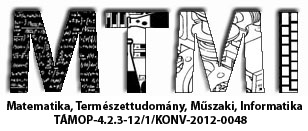Characterisation of the interaction between P-Rex1 and Neurochondrin
Előadás adatai
P-Rex (PIP3-dependent Rac exchanger) family enzymes activate the small G protein Rac, a key regulator of cytoskeletal structure, gene expression and reactive oxygen species formation. P-Rex1 controls neutrophil function, and is currently emerging as being required for the metastasis of several types of cancer. P-Rex2 regulates the morphology of Purkinje neurons and - together with P-Rex1 - it controls motor coordination. In our lab a number of novel protein binding partners of P-Rex1 have been recently identified by mass spectrometry in brain tissue. Among these is neurochondrin (norbin), a ubiquitous protein which is known as a regulator of neuronal morphology and function. The interaction of P-Rex1 with neurochondrin has been confirmed in vitro in cultured mammalian cells. Importantly, we have found that the interaction between P-Rex1 and neurochondrin causes changes in the structure of the actin cytoskeleton that result in a very distinctive cell shape we call “rosettes”. The aim of this study was to further characterise the interaction between P-Rex1 and neurochondrin in vitro. We transfected Human Embryonic Kidney-293 cells with P-Rex1 and neurochondrin constructs using jetPEI transfection reagent and performed GTP-Rac pull-down assays to investigate whether Rac activity changes as a result of the P-Rex1 / neurochondrin interaction. We found that overexpression of neurochondrin alone does not induce activation of Rac, however when co-expressed, neurochondrin increases P-Rex1-dependent Rac activation.
Támogatók: Támogatók: Az NTP-TDK-14-0007 számú, A Debreceni Egyetem ÁOK TDK tevékenység népszerűsítése helyi konferencia keretében, az NTP-TDK-14-0006 számú, A Debreceni Egyetem Népegészségügyi Karán folyó Tudományos Diákköri kutatások támogatása, NTP-HHTDK-15-0011-es A Debreceni Egyetem ÁOK TDK tevékenység népszerűsítése 2016. évi helyi konferencia keretében, valamint a NTP-HHTDK-15-0057-es számú, A Debreceni Egyetem Népegészségügyi Karán folyó Tudományos Diákköri kutatások támogatása című pályázatokhoz kapcsolódóan az Emberi Erőforrás Támogatáskezelő, az Emberi Erőforrások Minisztériuma, az Oktatáskutató és Fejlesztő Intézet és a Nemzeti Tehetség Program



